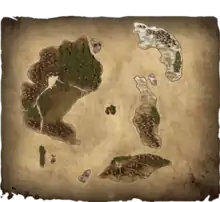Dawntide
Dawntide was a short-lived open world massively multiplayer online role-playing game developed by Working as Intended, an independent studio based in Copenhagen, Denmark. It used the Gamebryo engine from Emergent Game Technologies and CEGUI for UI. It featured a free-form advancement system.
| Dawntide | |
|---|---|
 | |
| Developer(s) | Working As Intended |
| Designer(s) | Martin Anward |
| Composer(s) | Dan Reynolds |
| Engine | Gamebryo[1] |
| Platform(s) | Microsoft Windows |
| Release | Cancelled |
| Genre(s) | Massively multiplayer online role-playing game |
| Mode(s) | Multiplayer |
The official launch date was October 1, 2011.[2] On March 2, 2012 the developer announced on the game website that development was temporarily suspended due to financial issues but development never resumed.[3]

Gameplay
In Cieve, the world of Dawntide, players are the driving element and the builders of a new civilization.[4] "They can create their own cities, even forming nations with their own realistic societies. Factions have the opportunity to create and enforce their own laws and establish a government, as well as giving other players the opportunity to break those laws and overthrow those governments – at their own risk."
Features
Features, implemented or otherwise, included: a free-form skill progression system,[5] fully player-buildable towns, four playable races, full loot PvP, an interdependent crafting system, and a sailing and exploration mechanic.
Notes
- Reahard, Jef (October 28, 2011). "Some Assembly Required: An early look at Dawntide". Joystiq. AOL. Archived from the original on January 4, 2015. Retrieved January 4, 2015.
- "Dawntide to Launch October 1st". Ten Ton Hammer. July 28, 2011. Retrieved January 4, 2015.
- Iantorno, Mathew (8 March 2012). "Dawntide Postmortem".
- "Dawntide: Storyline". Archived from the original on 24 August 2011.
- "Archived copy". Archived from the original on 2011-02-07. Retrieved 2010-12-13.CS1 maint: archived copy as title (link)
External links
- Official website at the Wayback Machine (archived May 26, 2013)